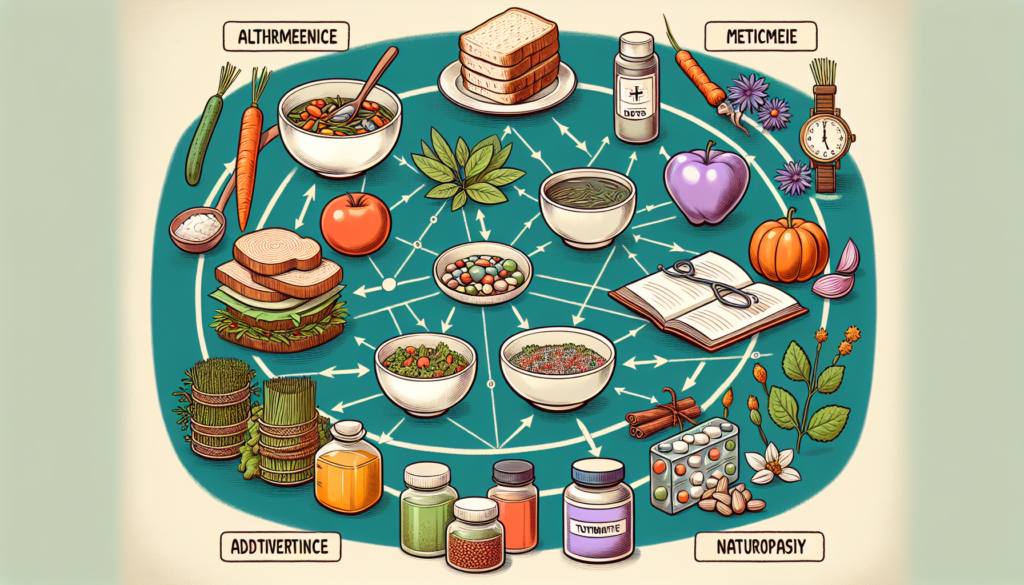In the world of alternative medicine, the role of diet is often a topic of interest. As more and more people turn to alternative forms of healing, the question arises: are there specific diets that are associated with alternative medicine? Many individuals believe that a balanced and wholesome diet can have a profound impact on our overall well-being, and alternative medicine practitioners often emphasize this connection. By exploring the potential relationship between diet and alternative medicine, we can gain a deeper understanding of how we can nourish our bodies and promote optimal health.
Are There Specific Diets Associated With Alternative Medicine?
Alternative medicine encompasses a wide range of practices and treatments that are used as alternatives or complements to conventional medicine. Many alternative medicine practices emphasize the importance of maintaining a healthy diet to promote overall well-being. While there is no one-size-fits-all diet in alternative medicine, there are several specific diets that are commonly associated with particular alternative medicine practices. In this article, we will explore some of these diets and their relationship to alternative medicine.

The Relationship Between Diet and Alternative Medicine
Alternative medicine approaches health and wellness from a holistic perspective, focusing on treating the whole person rather than just the symptoms of a specific condition. Diet plays a crucial role in this approach, as it is believed to have a significant impact on both physical and mental well-being. Many alternative medicine practices emphasize the consumption of whole, unprocessed foods that are rich in nutrients and free from potentially harmful additives. By following specific diets, individuals aim to balance their bodies, enhance energy, and promote healing. Let’s now delve into some of the diets commonly associated with alternative medicine.
1. Ayurvedic Diets
Originating from ancient India, Ayurveda is a holistic health system that emphasizes a harmonious balance between mind, body, and spirit. Ayurvedic diets are tailored to individuals based on their unique constitution, known as their dosha. There are three doshas: Vata, Pitta, and Kapha. Each dosha has specific dietary guidelines to maintain balance and promote optimal health.
1.1 Dosha-based Diets
For Vata individuals, who tend to be prone to anxiety and stress, a diet that includes warm, moist, and grounding foods is recommended. Pitta individuals, who are usually energetic and intense, benefit from cooling and hydrating foods. Kapha individuals, who tend to have a slower metabolism, are advised to consume light, warm, and spicy foods to encourage movement and stimulate digestion.
1.2 Satvik Diets
In Ayurveda, Satvik diets are considered to be the most beneficial for spiritual and physical well-being. These diets focus on consuming fresh, organic, and locally sourced foods that are free from pesticides and additives. Satvik diets primarily consist of whole grains, fruits, vegetables, nuts, seeds, and dairy products.
2. Traditional Chinese Medicine Diets
Traditional Chinese Medicine (TCM) is based on the concept of balancing and harmonizing opposing energies, known as Yin and Yang, within the body. TCM diets are designed to restore balance and promote the flow of Qi, the vital energy that sustains life.
2.1 Yin and Yang Balancing
A TCM diet seeks to balance Yin and Yang energies within the body. Yin foods, such as leafy greens, fruits, and tofu, are cooling and nourishing, while Yang foods, such as meat, spices, and ginger, are warming and invigorating. The goal is to consume a balanced combination of Yin and Yang foods to maintain well-being.
2.2 Five-Element Theory
The Five-Element Theory in TCM categorizes food into five elements: Wood, Fire, Earth, Metal, and Water. Each element corresponds to an organ system and has specific properties. Balancing these elements through diet is believed to promote harmony and optimal health. For example, a Wood element diet would include foods that support liver health, such as leafy greens, while a Fire element diet would include foods that nourish the heart, such as bitter greens.
3. Macrobiotic Diets
Macrobiotic diets are rooted in Eastern philosophy and focus on achieving balance through the consumption of whole, natural foods. These diets are primarily plant-based and consist of whole grains, beans, vegetables, and sea vegetables. Macrobiotic diets also emphasize the proper cooking methods and the balance of yin and yang foods to attain optimal health.

4. Raw Food Diets
Raw food diets emphasize the consumption of uncooked, unprocessed foods in their natural state. Advocates of raw food diets believe that cooking destroys enzymes and decreases the nutritional value of food. Raw food diets typically consist of fruits, vegetables, nuts, and seeds. Proponents of raw food diets claim that they can enhance digestion, boost energy levels, and support overall well-being.
5. Vegan and Vegetarian Diets
Vegan and vegetarian diets have gained popularity in recent years for their touted health and environmental benefits. Many alternative medicine practices support the adoption of plant-based diets due to their focus on whole, nutrient-dense foods.
5.1 Plant-based Diets
Plant-based diets prioritize the consumption of foods derived from plants, including fruits, vegetables, grains, legumes, nuts, and seeds. These diets are typically low in saturated fat and cholesterol and are rich in fiber, vitamins, and minerals. Plant-based diets have been associated with numerous health benefits, including a reduced risk of heart disease, certain cancers, and chronic conditions.
5.2 Whole Food Diets
Whole food diets focus on consuming foods in their most natural form, free from processing or refinement. These diets avoid or minimize the consumption of processed and packaged foods that may contain additives, preservatives, and artificial ingredients. Whole food diets prioritize nutrient-dense foods such as fruits, vegetables, whole grains, lean proteins, and healthy fats.
5.3 Gluten-free Diets
Gluten-free diets exclude the protein gluten, which is found in wheat, barley, and rye. While gluten-free diets are primarily followed by individuals with gluten sensitivity or celiac disease, some alternative medicine practices recommend the elimination of gluten for improved digestion and overall well-being.

6. Mediterranean Diet
The Mediterranean diet is inspired by the traditional dietary patterns of countries bordering the Mediterranean Sea. This diet emphasizes the consumption of fruits, vegetables, legumes, whole grains, fish, and monounsaturated fats, such as olive oil. The Mediterranean diet is renowned for its heart-healthy benefits and is associated with a reduced risk of chronic diseases, including cardiovascular disease and certain cancers.
7. Specific Carbohydrate Diet
The Specific Carbohydrate Diet (SCD) is a restrictive diet commonly recommended for individuals with digestive disorders such as Crohn’s disease and ulcerative colitis. The SCD aims to reduce the consumption of complex carbohydrates and eliminate certain sugars to alleviate symptoms and promote healing.

8. Elimination Diets
Elimination diets involve the temporary removal of certain foods or food groups to identify and manage food intolerances, sensitivities, or allergies.
8.1 Food Intolerance and Sensitivity
Food intolerance and sensitivity elimination diets aim to identify specific foods or ingredients that may be causing adverse reactions in individuals. These diets typically involve removing suspected trigger foods and gradually reintroducing them to observe any reactions or symptoms.
8.2 Allergenic Food Exclusion
Allergenic food exclusion diets are necessary for individuals with food allergies. These diets involve strictly avoiding specific food allergens, such as peanuts, tree nuts, shellfish, dairy, eggs, soy, or wheat, to prevent severe allergic reactions.
9. Gerson Therapy
Gerson Therapy is an alternative cancer treatment that involves an intensive diet and lifestyle regimen. The diet consists of consuming large amounts of organic fruits, vegetables, and juices, while eliminating processed foods, animal products, and fats. Gerson Therapy emphasizes detoxification and aims to boost the body’s natural healing abilities.

10. Blood Type Diets
Blood type diets propose that individuals should eat certain foods based on their blood type. The diet suggests that individuals with different blood types digest and metabolize foods differently, affecting overall health. While the scientific evidence supporting blood type diets is limited, some individuals claim to have experienced health benefits by following these customized diets.
Conclusion
While alternative medicine does not adhere to a single specific diet, there are various diets associated with different alternative medicine practices. These diets aim to promote balance, overall health, and well-being. It is essential to consult with a qualified healthcare practitioner or nutritionist before adopting any specific diet associated with alternative medicine to ensure it aligns with your individual needs and health goals. Remember, achieving and maintaining good health involves a holistic approach that encompasses a balanced diet, regular exercise, stress management, and other lifestyle factors.


